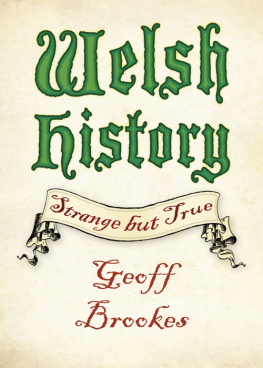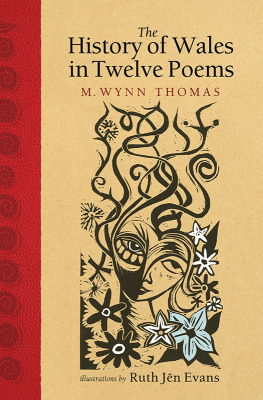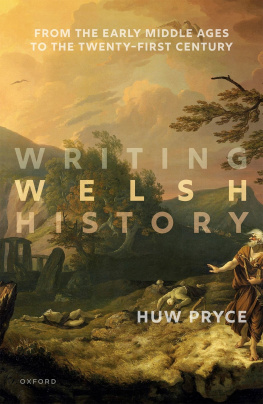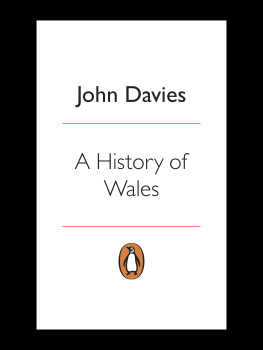Russell Davies, 2015
Cover image: Donkey rides in Aberdaron c.1885. From the John Thomas Collection, by permission of The National Library of Wales.
All rights reserved. No part of this book may be reproduced in any material form (including photocopying or storing it in any medium by electronic means and whether or not transiently or incidentally to some other use of this publication) without the written permission of the copyright owner except in accordance with the provisions of the Copyright, Designs and Patents Act 1988. Applications for the copyright owners written permission to reproduce any part of this publication should be addressed to the University of Wales Press, 10 Columbus Walk, Brigantine Place, Cardiff CF10 4UP.
www.uwp.co.uk
British Library Cataloguing-in-Publication Data.
A catalogue record for this book is available from the British Library.
ISBN 978-1-78316-237-6
eISBN 978-1-78316-239-0
The right of Russell Davies to be identified as author of this work has been asserted in accordance with sections 77, 78 and 79 of the Copyright, Designs and Patents Act 1988.
i dri hanesydd, meistri eu crefft, a geisiodd ddysgu hanes fy ngwlad am pobl i mi:
John Davies
Geraint Jenkins
Ieuan Gwynedd Jones
pe bawn ond wedi mynd i fwy o ddarlithoedd...
ac i bedair cenhedlaeth o Gymry sydd wedi cyfoethogi fy nhaith:
fy nhad John Haydn Davies, Dai a Beryl
Nerys
Betsan a Dylan, Ffion ac Udara
Cati a Beca
Prologue: Sources for a Sullen Art
Nes nar hanesydd at y gwir di-goll, ydywr dramodydd, sydd yn gelwydd oll.
(Closer than the historian to the lost truths is the dramatist who deals in lies).
R. Williams Parry, Gwae Awdur Dyddiaduron
Historians, especially those working on the earliest historical periods, often bemoan their lack of sources. Others, with an echo of British Rails excuse that the wrong type of snow caused train delays, complain that the material available does not allow them to answer the particular questions they wish to ask. Anyone who has worked on the late nineteenth and early twentieth centuries, is aware of another difficulty there is too much material for teams of academics, let alone an individual, to read and comprehend. Thus the historian of modern Wales must have considerable sympathy for the hero of Laurence Sternes eighteenth-century novel Tristram Shandy, who worries that, since he has spent two years chronicling the first two days of his life, material will accumulate faster than he can cope with it and, as time goes by, he will be further and further from the end of his history.
The shelves of the libraries, museums and archives of Wales groan under the weight of autobiographies, biographies, census reports, diaries, family and personal papers, journals, letters, official govern ment papers, newspapers, hymn books, novels and poems, each of which is relevant to our study. Many of these documents are now available on internet sites, providing the historian with unbroken and unlimited access to the sources. In this respect a priceless resource is the Gathering the Jewels project, which enables the historian to browse the treasures of the Welsh archives from desk or laptop.1
It is almost axiomatic for many historians that the facts of the past are to be found in the official documents created by a society. The stately and staid volumes of the reports of official bodies appointed by governments, to inquire and enquire into specific events or to observe and preserve societys attitudes, are often regarded as if they possess an almost biblical prescience and infallibility. But we need to remember that official documents are not exempt from the problems and pitfalls of all historical sources. They too contain bias, opinion and prejudice and many are as much creative works as they are factual testimonies. Official sources do not always reveal the entire story. Public records such as court papers and the Registrar Generals statistics provide skeletal details that hint at vivid tales of illegitimacy, forced marriages, infant mortality, enforced separations of warring partners and entire families and neighbourhoods locked in moral decline. Other sources are needed to tease out the detail of these tragic tales.
A peoples literature, in contrast to official records, reveals much of what actually concerned people. Fiction is often as useful as fact in revealing their innermost and intimate obsessions. Writers often offer unique viewpoints into their worlds, while historical novelists operate in the no-mans-land between history and fiction where historians fear to tread. They walk with the dead unfettered by footnotes. To those with a historiographical training, such in-discipline appears to provide an unfair liberation. But in reality this is a terrible kind of freedom as, ironically, the writer of fiction is actually firmly fettered by credibility, whereas the writer of facts is not. Not all creative writing was, or is, make-believe.2 The sleuthing of literary detectives such as John Harris into the dark background of Caradoc Evans and J. Elwyn Hughes into the darker upbringing of Caradog Prichard have uncovered the real individuals involved in their nightmare fictions.3 Ballads, novels, poems and short stories can be read historically by a historian without venturing unduly into the field of literary criticism. Swansea Universitys Centre for Research into the English Literature and Language of Wales (CREW) has published several detailed studies which provide novel insights into the inner lives of the Welsh people.4 The Welsh Assembly Government also deserves considerable praise for funding Parthian Presss project of republishing the out-of-print classics of the Library of Wales, as does Honnos campaign to republish classic works by women authors.5
But the legacy of this age is not only in print. The historian of modern Wales has another considerable advantage over those of earlier periods. A vast range of artistic, audio, aural, dramatic, cinematic and photographic material has been lovingly preserved in the archives. Such sources need to be interpreted with care and caution. The superb collections of photographers, such as those of David Harries of Llandeilo and John Thomas of Liverpool, reveal an animated world of bucolic business and industry.6 Their studio portraits of workers in the clothes of their trade are intimate character sketches, from which one can almost still smell the stench of night-breath, underarm sweat and over-worn clothes. Stare long enough at these photographs and some of the reality sinks in the pervasive dirt, the clothing gone to shreds and holes, the seams and furrows of worry on faces and foreheads. Every picture told, and tells, a story. But these studies in sepia also reflect the desire to pose, or be posed, in the style of contemporary aesthetic norms rather than according to social reality. Sailor-suited siblings, dressed for the event, play inattentively with dolls, sailing ships and model steam-engines, the toys provided by the photographer rather than their own personal favourites. Even from its earliest origins, the camera lied. A historian must learn to question the image which meets the eye.7









